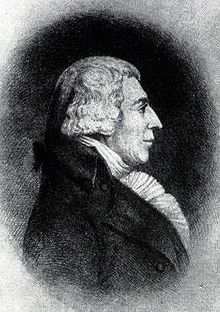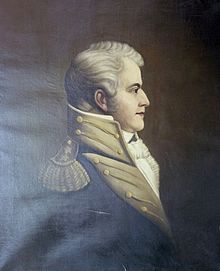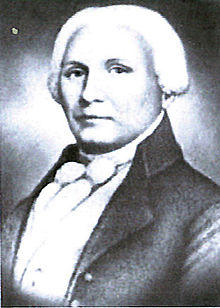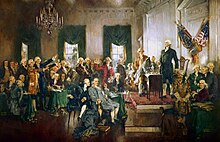Hillsborough Convention


The Hillsborough Convention, was the first of two North Carolina conventions to ratify the United States Constitution. Delegates represented 7 boroughs and 59 counties, including six western counties that became part of Tennessee when it was created in 1796. They met in Hillsborough, North Carolina from July 21 to August 4, 1788 to deliberate and determine whether to ratify the Constitution recommended to the states by the General Convention that had been held in Philadelphia the previous summer. The delegates had won their seats through special elections held in March 1788, as mandated by the North Carolina General Assembly.[1] Governor Samuel Johnston presided over the Convention.[2] The Hillsborough Convention was dominated by anti-Federalists, and North Carolina did not ratify the Constitution until the Fayetteville Convention, which met a year later.
Location[]
The convention was held in Hillsborough, North Carolina, at the St. Matthew's Episcopal (Church of England) Church. The church was located on lot 98 in Hillsborough. It was also the location of the third Provincial Congress of North Carolina of 1775 and the meeting place of the North Carolina Legislature in 1778, 1782 and 1783. The church was destroyed by fire before 1800s. A new structure was built on the site in 1814 and became the Hillsborough Presbyterian Church in 1816.[3][4][5]
Division[]
Key state Federalists were James Iredell Sr., William Richardson Davie, and William Blount. Anti-Federalist leaders included Willie Jones, Samuel Spencer, and Timothy Bloodworth. The Anti-Federalist delegates outnumbered their Federalist colleagues by a margin of two to one. The Federalists wanted to strengthen the powers of the federal government to help the country keep from dissolving. They argued that the powers granted to the federal government in the Articles of Confederation were not sufficient. On the other side, the Anti-Federalists were suspicious of the federal government and did not want self-rule to come under fire from a government that could intrude on state and individual rights. Knowing that they would likely lose, members of the Federalist minority brought a stenographer to the convention to record their arguments for publication in the hopes of changing public opinion in the future.[6]
Outcome[]
The debate resulted in the delegates voting 184 to 84 to neither ratify nor reject the Constitution. One of the major reasons for North Carolina not ratifying the Constitution was its lack of a Bill of Rights. The delegates, however, proposed a series of amendments to personal liberties and urged the new federal Congress to adopt measures to incorporate a bill of rights into the Constitution.[7] North Carolina would not join the Union until after it ratified the Constitution, more than a year later, at the November 1789 Fayetteville Convention.[8][9][10][11]
Delegates[]











There were 294 known delegates from the 59 counties and seven boroughs of North Carolina. Some counties (Greene, Sullivan, Sumner, Tennessee, Washington) later became part of the state of Tennessee in 1796.[12][13] The election of delegates from Dobbs County was declared invalid because of violence that led to the loss of the ballot box.[14][15]
Governor Samuel Johnston was the President of the Convention. While his home was in Chowan County, he represented Perquimans County in the Convention. was the secretary and was the assistant secretary of the Convention. The doorkeepers of the convention were , , , and .[15]
| Order | County or Borough | Delegate | Yeas | Nays |
|---|---|---|---|---|
| 1 | Perquimans | Johnston, Samuel, Esq., President | x | |
| 2 | Borough of Edenton | Iredell, James | x | |
| 3 | Borough of Wilmington | x | ||
| 4 | Beaufort | x | ||
| 5 | Beaufort | x | ||
| 6 | Beaufort | x | ||
| 7 | Bertie | x | ||
| 8 | Bertie | x | ||
| 9 | Bladen | x | ||
| 10 | Burke | McDowell, Charles | x | |
| 11 | Craven | Spaight, Richard Dobbs | x | |
| 12 | Bertie | x | ||
| 13 | Cumberland | x | ||
| 14 | Cumberland | x | ||
| 15 | Cumberland | x | ||
| 16 | Carteret | x | ||
| 17 | Carteret | x | ||
| 18 | Currituck | x | ||
| 19 | Currituck | x | ||
| 20 | Chowan | x | ||
| 21 | Chowan | Johnson, Charles | x | |
| 22 | Chowan | x | ||
| 23 | Chowan | x | ||
| 24 | Camden | x | ||
| 25 | Camden | Gregory, Isaac | x | |
| 26 | Camden | x | ||
| 27 | Camden | x | ||
| 28 | Camden | x | ||
| 29 | Chatham | x | ||
| 30 | Robeson | x | ||
| 31 | Robeson | x | ||
| 32 | Robeson | x | ||
| 33 | Robeson | x | ||
| 34 | Sumner | x | ||
| 35 | Sumner | x | ||
| 36 | Tyrrell | (sometimes Stewart) | x | |
| 37 | Tyrrell | x | ||
| 38 | Wake | x | ||
| 39 | Wake | x | ||
| 40 | Borough of Salisbury | Steele, John | x | |
| 41 | Borough of Halifax | Davie, William Richardson | x | |
| 42 | Gates | Riddick, Joseph | x | |
| 43 | Gates | x | ||
| 44 | Gates | x | ||
| 45 | Hertford | x | ||
| 46 | Hyde | x | ||
| 47 | Hyde | x | ||
| 48 | Hyde | x | ||
| 49 | Hyde | x | ||
| 50 | Hyde | (Harvey) | x | |
| 51 | Lincoln | x | ||
| 52 | Lincoln | x | ||
| 53 | Lincoln | x | ||
| 54 | Martin | x | ||
| 55 | Martin | x | ||
| 56 | Martin | x | ||
| 57 | Mecklenburg | Irwin, Robert | x | |
| 58 | Pasquotank | x | ||
| 59 | Pasquotank | x | ||
| 60 | Pasquotank | x | ||
| 61 | Pasquotank | x | ||
| 62 | Pasquotank | x | ||
| 63 | Perquimans | Skinner, William | x | |
| 64 | Perquimans | x | ||
| 65 | Perquimans | x | ||
| 66 | Perquimans | x | ||
| 67 | Hertford | x | ||
| 68 | Craven | x | ||
| 69 | Johnston | (Bridger) | x | |
| 70 | Carteret | x | ||
| 71 | Tyrrell | x | ||
| 72 | Tyrrell | x | ||
| 73 | Bertie | [15][16] | x | |
| 74 | Martin | Hill, Whitmell | x | |
| 75 | Brunswick | Smith, Benjamin | x | |
| 76 | Borough of New Bern | x | ||
| 77 | Chowan | x | ||
| 78 | Bladen | x | ||
| 79 | Hertford | x | ||
| 80 | Pitt | x | ||
| 81 | Currituck | x | ||
| 82 | Currituck | x | ||
| 83 | Gates | x | ||
| 84 | Craven | x | ||
| 85 | Halifax | Jones, Willie | x | |
| 86 | Anson | Spencer, Samuel | x | |
| 87 | Anson | x | ||
| 88 | Anson | Wade, Thomas | x | |
| 89 | Anson | x | ||
| 90 | Beaufort | x | ||
| 91 | Brunswick | x | ||
| 92 | Brunswick | x | ||
| 93 | Bladen | x | ||
| 94 | Burke | x | ||
| 95 | Burke | McDowell, Joseph "Pleasant Gardens" | x | |
| 96 | Burke | x | ||
| 97 | Craven | Williams, Benjamin | x | |
| 98 | Craven | x | ||
| 99 | Cumberland | x | ||
| 100 | Cumberland | (McCallister) | x | |
| 101 | Caswell | x | ||
| 102 | Caswell | x | ||
| 103 | Caswell | x | ||
| 104 | Chatham | Ramsey, Ambrose | x | |
| 105 | Chatham | x | ||
| 106 | Chatham | x | ||
| 107 | Chatham | x | ||
| 108 | Davidson | x | ||
| 109 | Davidson | x | ||
| 110 | Davidson | x | ||
| 111 | Davidson | x | ||
| 112 | Davidson | (Dobbin) | x | |
| 113 | Edgecombe | x | ||
| 114 | Edgecombe | x | ||
| 115 | Edgecombe | x | ||
| 116 | Edgecombe | x | ||
| 117 | Edgecombe | x | ||
| 118 | Franklin | x | ||
| 119 | Franklin | x | ||
| 120 | Franklin | x | ||
| 121 | Pitt | x | ||
| 122 | Pitt | x | ||
| 123 | Pitt | x | ||
| 124 | Pitt | x | ||
| 125 | Guilford | Caldwell, David | x | |
| 126 | Guilford | (Gowdy) | x | |
| 127 | Guilford | x | ||
| 128 | Guilford | x | ||
| 129 | Guilford | x | ||
| 130 | Granville | Person, Thomas | x | |
| 131 | Granville | x | ||
| 132 | Granville | x | ||
| 133 | Granville | x | ||
| 134 | Granville | x | ||
| 135 | Rutherford | x | ||
| 136 | Rutherford | x | ||
| 137 | Rutherford | x | ||
| 138 | Randolph | x | ||
| 139 | Randolph | x | ||
| 140 | Rockingham | x | ||
| 141 | Robeson | x | ||
| 142 | Surry | x | ||
| 143 | Surry | x | ||
| 144 | Surry | x | ||
| 145 | Surry | (Bostwick) | x | |
| 146 | Sullivan | x | ||
| 147 | Sullivan | x | ||
| 148 | Sampson | x | ||
| 149 | Sampson | x | ||
| 150 | Sampson | x | ||
| 151 | Sampson | x | ||
| 152 | Sampson | x | ||
| 153 | Washington | (Alison) | x | |
| 154 | Washington | (Stewart) | x | |
| 155 | Washington | x | ||
| 156 | Warren | x | ||
| 157 | Warren | x | ||
| 158 | Warren | x | ||
| 159 | Wayne | x | ||
| 160 | Wayne | x | ||
| 161 | Wake | (Sanders)[15] | x | |
| 162 | Wilkes | Lenoir, William | x | |
| 163 | Wilkes | x | ||
| 164 | Wilkes | Brown, John | x | |
| 165 | Wilkes | x | ||
| 166 | Wilkes | x | ||
| 167 | Hertford | x | ||
| 168 | Hertford | x | ||
| 169 | Hawkins | x | ||
| 170 | Jones | Bryan, Nathan | x | |
| 171 | Jones | x | ||
| 172 | Jones | x | ||
| 173 | Lincoln | x | ||
| 174 | Lincoln | x | ||
| 175 | Moore | x | ||
| 176 | Moore | x | ||
| 177 | Moore | x | ||
| 178 | Moore | x | ||
| 179 | Moore | x | ||
| 180 | Martin | x | ||
| 181 | Mecklenburg | Graham, Joseph (John?) | x | |
| 182 | Montgomery | x | ||
| 183 | Montgomery | x | ||
| 184 | Montgomery | x | ||
| 185 | Montgomery | x | ||
| 186 | Northampton | (Bentford) | x | |
| 187 | Northampton | x | ||
| 188 | Northampton | x | ||
| 189 | Northampton | x | ||
| 190 | Nash | x | ||
| 191 | Nash | x | ||
| 192 | Nash | x | ||
| 193 | Nash | x | ||
| 194 | Nash | x | ||
| 195 | Onslow | x | ||
| 196 | Onslow | x | ||
| 197 | Onslow | , Jr. | x | |
| 198 | Borough of Hillsboro | x | ||
| 199 | Orange | Mebane, Alexander | x | |
| 200 | Orange | x | ||
| 201 | Orange | x | ||
| 202 | Orange | x | ||
| 203 | Orange | x | ||
| 204 | Warren | x | ||
| 205 | Warren | x | ||
| 206 | Caswell | x | ||
| 207 | Washington | x | ||
| 208 | Washington | x | ||
| 209 | Rockingham | x | ||
| 210 | Rockingham | x | ||
| 211 | Rockingham | x | ||
| 212 | Rockingham | x | ||
| 213 | Caswell | x | ||
| 214 | Richmond | (McAllastar) | x | |
| 215 | Sullivan | x | ||
| 216 | Sullivan | x | ||
| 217 | Bladen | x | ||
| 218 | New Hanover | x | ||
| 219 | New Hanover | Williams, John Pugh | x | |
| 220 | Hawkins | x | ||
| 221 | Richmond | x | ||
| 222 | Duplin | Gillespie, James | x | |
| 223 | Duplin | x | ||
| 224 | Jones | x | ||
| 225 | Jones | x | ||
| 226 | Wayne | x | ||
| 227 | Brunswick | x | ||
| 228 | Brunswick | x | ||
| 229 | Rowan | x | ||
| 230 | Rutherford | x | ||
| 231 | Rutherford | x | ||
| 232 | Mecklenburg | x | ||
| 233 | Mecklenburg | x | ||
| 234 | Mecklenburg | x | ||
| 235 | Randolph | x | ||
| 236 | Duplin | Kenan, James | x | |
| 237 | Halifax | x | ||
| 238 | Halifax | x | ||
| 239 | Halifax | x | ||
| 240 | Halifax | x | ||
| 241 | Franklin | x | ||
| 242 | Wayne | x | ||
| 243 | Johnston | x | ||
| 244 | Johnston | x | ||
| 245 | Johnston | x | ||
| 246 | Richmond | x | ||
| 247 | Duplin | x | ||
| 248 | Surry | x | ||
| 249 | Rowan | Rutherford, Griffith | x | |
| 250 | Rowan | x | ||
| 251 | New Hanover | Bloodworth, Timothy | x | |
| 252 | Johnston | x | ||
| 253 | Greene | x | ||
| 254 | Greene | x | ||
| 255 | Greene | x | ||
| 256 | Bladen | x | ||
| 257 | Richmond | x | ||
| 258 | Burke | McDowall, Joseph, Jr. | x | |
| 259 | Franklin | x | ||
| 260 | New Hanover | x | ||
| 261 | Wake | x | ||
| 262 | Wake | x | ||
| 263 | New Hanover | x | ||
| 264 | Rowan | Brandon, James (Brannon) | x | |
| 265 | Duplin | (Dicks) | x | |
| 266 | Wayne | x | ||
| 267 | Rowan | Locke, Matthew (Lock) | x | |
| 268 | Hawkins | x | ||
| 269 | Anson | [15] | ||
| 270 | Carteret | [15] | ||
| 271 | Carteret | [15] | ||
| 272 | Borough of Fayetteville | [15] | ||
| 273 | Dobbs | Caswell, Richard[15] | ||
| 274 | Dobbs | Glasgow, James[15] | ||
| 275 | Dobbs | [15] | ||
| 276 | Dobbs | [15] | ||
| 277 | Dobbs | (Lasseter)[15] | ||
| 278 | Montgomery | [15] | ||
| 279 | New Hannover | [15] | ||
| 280 | Northampton | [15] | ||
| 281 | Onslow | (Sneed)[15] | ||
| 282 | Onslow | [15] | ||
| 283 | Randolph | [15] | ||
| 284 | Randolph | [15] | ||
| 285 | Sullivan | [15] | ||
| 286 | Sumner | [15] | ||
| 287 | Sumner | [15] | ||
| 288 | Sumner | [15] | ||
| 289 | Tennessee | [15] | ||
| 290 | Tennessee | [15] | ||
| 291 | Tennessee | [15] | ||
| 292 | Tennessee | [15] | ||
| 293 | Tennessee | [15] | ||
| 294 | Tyrrell | [15] |
See also[]

- Fayetteville Convention
- History of the United States Constitution
- Scene at the Signing of the Constitution of the United States, 1940 painting by Howard Chandler Christy, shows Richard Dobbs Spaight, William Blount, and Hugh Williamson of North Carolina at center stage
- Timeline of drafting and ratification of the United States Constitution
References[]
- ^ Cavanagh, John C. (2006). "Convention of 1788". NCpedia. Retrieved December 1, 2015.
- ^ "Hillsborough Convention of 1788". NorthCarolinahistory.org An Online Encyclopedia. North Carolina History Project. Retrieved February 20, 2017.
- ^ "Church History". Hillsborough Presbyterian Church. Hillsborough, North Carolina. Retrieved December 3, 2015.
- ^ "New Plaque Honors NC Leaders Who Did Not Sign Constitution Until Bill Of Rights Added". WUNC91.5. November 17, 2014.
- ^ "Marker G-131, Constitutional Convention 1788". NCMarkers.com. Retrieved July 29, 2019.
- ^ "July 21, 2013: Hillsborough Convention Fails to Ratify Constitution". This Day in North Carolina History. North Carolina Department of Natural and Cultural Resources. Retrieved December 1, 2015.
- ^ Watson, Alan (2011). General Benjamin Smith: A Biography of the North Carolina Governor. McFarland. p. 52. ISBN 978-0786461561.
- ^ "Fayette Convention of 1789". NorthCarolinaHistory.org. Retrieved July 22, 2019.
- ^ John C. Cavanaugh, Decision at Fayetteville (Raleigh, 1989)
- ^ William Price, Jr., "’There Ought to Be a Bill of Rights’: North Carolina Enters a New Nation," in The Bill of Rights and the States, ed. Patrick T. Conley and John Kaminski (Lanham, Maryland, 1992)
- ^ Louise Irby Trenholme, The Ratification of the Federal Constitution in North Carolina (Columbia, Missouri, 1932)
- ^ "Proceedings and Debates of the Convention of North-Carolina, Convened at Hillsborough, on Monday the 21st Day of July, 1788, for the Purpose of Deliberating and Determining on the Constitution Recommended by the General Convention at Philadelphia, the 17th Day of September, 1787: To Which is Prefixed the Said Constitution:". 1788. Retrieved July 29, 2019.
- ^ Counties were not listed for the delegates in the minutes, so the 1904 Manual was used.
- ^ Connor, Henry Grove (August 1904). "The Convention of 1788‑'89 and the Federal Constitution — Hillsborough and Fayetteville". Retrieved July 29, 2019.
- ^ a b c d e f g h i j k l m n o p q r s t u v w x y z aa ab ac ad Connor, R.D.D. (1913). A Manual of North Carolina (PDF). Raleigh: North Carolina Historical Commission. p. 863-. Retrieved April 27, 2019.
- ^ Minutes say Tanner vice Turner as in Manual
Additional sourcing:
- Gillespie, Michael Allen Gillespie (1989). Liensch, Michael (ed.). North Carolina: Preserving Rights. Ratifying the Constitution.
- Price, William S. (1991). The Bill of Rights and North Carolina: There Ought to be a Bill of Rights.
External links[]
- North Carolina. Convention (1788) "Proceedings and Debates of the Convention of North-Carolina, Convened at Hillsborough, ..", Documenting the American South (DocSouth), a digital publishing initiative sponsored by the University Library at the University of North Carolina at Chapel Hill
- 1788 in the United States
- 1788 in North Carolina
- History of North Carolina
- Ratification of the United States Constitution
- 1788 in American politics